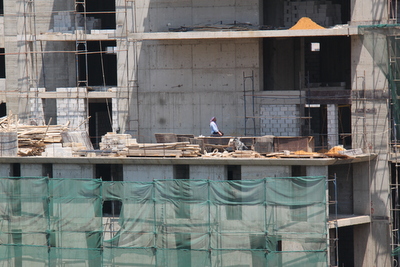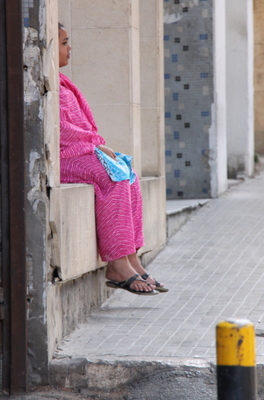Yet again Lebanon is split by pro-Syrian and anti-Syrian feeling. Which reminds me of a joke I was told here.
A Lebanese, a Syrian, and a black man are in a hospital waiting room. All of their wives are in labour. The men are talking anxiously to one another trying to stay calm. Then the doctor walks in and announces that all of their wives have given birth to healthy baby boys all within minutes of each other. The men start celebrating and congratulating each other, but then the doctor says, “But I have a bit of bad news”. The men fall silent. He continues, “The nurse got confused and we don’t know which boy belongs to whom”. At that the Lebanese man runs into the maternity ward and grabs the black baby, yelling, “This one is mine!” The doctor runs after him and objects, “But sir, both you and your wife are white.” The Lebanese man looks at him and replies, “Listen, one of the other two is Syrian, I am NOT taking any chances!”
Is this a racist joke or is it a joke on racism, a joke ridiculing the stupidity of racism? I tend to think people here use it as the latter.
I’d say it’s a joke on “next-door neighbour” prejudice, the type where the French poke fun at their Belgian neighbours, and the English try to put down the Scots. Most of those kind of jokes have more in common with sibling rivalry than racism.
It hints at the bitterness the Lebanese still feel against Syria which withdrew from Lebanon relatively recently (2005). And it highlights the lasting prejudice against the many Syrian labourers currently earning their living in the country.
But I have a feeling the punchline relies not just on the genetic impossibility of the black baby belonging to the white couple, but on the understanding that in Lebanon, associating with blacks is a much bigger deal than associating with Syrians. Jokes like this hang on that click of recognition, that ring of truth. These attitudes still ring true in Lebanese society today.
Ironically, the setting is unrealistic – the Lebanese, Syrian and black man all chatting in the same hospital waiting room, even under such stress.
My husband visited a Nigerian friend in hospital a while back. He’d just had an operation. At the reception, no-one could find his name. After having it spelt out, the receptionist realised she was not dealing with a Lebanese patient but rather an immigrant. This explained everything. Immigrant workers were not listed along with all the other patients. They were stashed away at the other end of the hospital on their own.
After the Ethiopian Airlines plane crash off the coast of Lebanon in January 2010, it was rumoured that those who died were put in separate morgues according to race – Lebanese and European in one, Ethiopian maids in another, so grieving families and friends need not mix. This wouldn’t even be surprising to people who know Lebanon, let alone shocking.
People are tickled by the “extremes” the Lebanese joke character is willing to go to because of his next-door neighbour prejudice. Is this because they view interracial association as “extreme” (and are therefore racist)? Or do they just recognise how rare it is in their own racist society (and are therefore alert to social issues)?
Although Lebanese may tell this joke to ridicule themselves and their own next-door neighbour prejudice, I feel that in telling it they overlook a deeper racism, a racism without which they wouldn’t find the joke funny. I think it’s a joke on racism towards their neighbours of the same gene pool. But it’s a racist joke regarding blacks. It only works if you share the basic assumption that ending up with a black baby would be not just scientifically impossible, but also socially inconceivable.


After having the myriad Lebanese ethno & socioeconomic prejudices explained to me, I was wondering how a Lebanese expat that moves to the US feels when they suddenly find themselves knocked down a few notches in the ethnic hierarchy after anti-Arab attitudes became more pervasive in the 9/11 aftermath. This sort of flips your topic to the opposite side, but I think there’s some irony there. I’ve also seen instances of some European countries struggling with anti-Islamic attitudes (which usually results in a blatant anti-Arab attitude, since everyone knows all people in the Arab world are the same religion) and I wonder if the same thing happens there? It’s also interesting that most Lebanese (in the US) would label themselves white, which I think surprises most Americans, as we tend to think of “white” as European ancestry. Of course, race and ethnicity is a rather loaded topic in the US that many people find difficult to discuss without resorting to hysterics so maybe not the best examples :)
Very good point Chrissy – strangely I have just written a piece touching on this prejudice that Lebanese face abroad and the link it may have with their own feelings towards foreigners. It’ll go online shortly – but maybe after another post. I have to say that when I started writing about racism here I just couldn’t stop and it became a whole bunch of posts. But I don’t want to blitz you all after lying dormant so long!
I shall look forward to more of your posts, Georgia!
Speaking as someone on the far fringes of Lebanese-American life, I can say that, in my family, the mode was to adapt quickly. I grandfather changed his name from Aziz to ‘Edward’ to avoid reproach; I’ve heard stories that my great-grandmother said “we aren’t Arabs, we’re Lebanese!”; my uncle pronounces our name “Kam-el” instead of “Kamal”; I never learned a word of Arabic growing up and my dad (second generation) only knows profanity; everyone in our family, from my father’s generation and mine, have married white people. In short, all we’ve kept is our name and our food.
Famous Lebanese-Americans like Casey Casum and Danny Thomas changed their names (not to say that other Americans of Arab descent didn’t).
Do we blame it on the continued movement of people from Lebanon, from the time of Phoenicia on? Do we blame it on the fact that Lebanon has maintained a strong Christian tradition in an otherwise Muslim region? I don’t know. All I can say is that the flip side of the coin is that, speaking very generally, the Lebanese in America seem to meld in and probably don’t think of themselves as a race apart. The closest I’ve come to prejudice is having to wait 5 minutes at the airport while they checked out my ID to make sure I wasn’t the Kamal on the most-wanted list.
I’m not sure that’s called adaptation. I think there’s a big difference between integration and assimilation, and I’m quite certain your family has gone with the latter. You threw away your identity for the sake of not being identified as “arabs”. That strikes me as a case of borderline inferiority complex, compensated by trying to pass yourself off as “white” (i.e of european descent), and that’s a common case among many Lebanese living abroad. It’s a shame..
The Lebanese are naturally good at adapting to new circumstances within Lebanon, so it doesn’t surprise me to see how flexible they are once living in other cultures, and in a way that’s admirable, though like Fadi says it’s a shame to lose your original culture. But then again after three generations or so that’s common regardless of origin. America is full of such people, which also makes it more accepting of others. But those visiting from Lebanon, especially if they only have a Lebanese passport, sometimes face different reactions I feel.
Quite true Georgia, about America having an assimilating effect on its immigrants after a few generations. It’s difficult to keep one’s own culture here, even the friends I have who are having 1st gen children have to make a concerted effort to pass along language. It’s one of the reasons I want to move abroad myself. Although I’m American, I find the culture sometimes too bland and watered-down. Worse is that it’s spreading- you don’t know how depressing it was to see a Kentucky Fried Chicken in the middle of Vietnam.